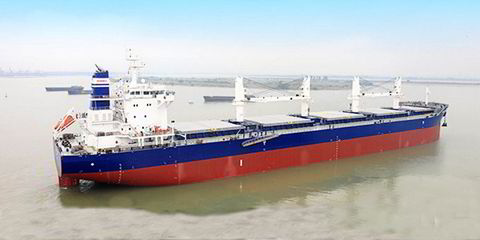Shipping should keep recovering from the 2016 downtown for a couple years, but will fall again due to regained overconfidence, says Blue Wall Shippping chief executive George Gourdomichalis.
“It’s human nature,” said Gourdomichalis, who is also managing director of Phoenix Shipping & Trading, which manages Blue Wall’s eight dry bulk vessels.
“Eventually yes, but I just hope it’s not that soon,” he added with a laugh. “That’s part of the game….The trick is to manage it correctly.”
Gourdomichalis told this to TradeWinds after taking part in a seven-member panel on “Political Turmoil and its Effect on Shipping” at today’s Hellenic Norwegian-American Chambers of Commerce conference.
He said 2017 was a “turning point” in the market improvement, which will keep on for the next two years, given a few caveats, he said.
“One of them is that we don’t collectively shoot ourselves in the foot again through over-ordering,” he said.
He said the upswing should also continue in the relative short term as long as there is no “glitch” in the ongoing recovery in global GDP and world trade.
In addition to over-ordering and slowdown in global GDP, he said deflation in commodity values across the world contributed to the downturn.
“A combination of all of those things led to the very soft markets we experienced,” he said.
During the talk on political disruption, John Sitilides, principal of Trilogy Advisors, highlighted three regions as “political hotspots” for shipping: South China Sea, the Middle East and the Arctic.
He said China has exerted dominance over the South China Sea shipping lanes by staking claims to “artificial islands” throughout the region.
“The South China Sea is an area of political tension, if not some sort of showdown, between China and the United States,” he said.
He said China’s ultimate goal is to become a major world power, one manifestation being the multi-trillion-dollar development of “One Belt, One Road” through Asia and ultimately to Europe.
“China sees itself as the inheritor of a grand civilization that dates back 3,000, 4,000, 5,000 years ago, and they’re going to reclaim their rightful claim to … Asia and then potentially become a major global power on par with the United States,” he said.





